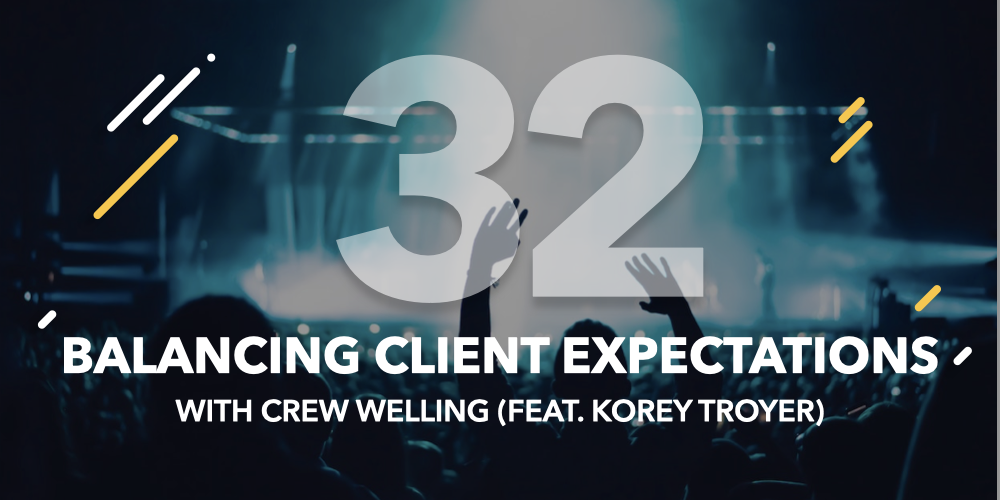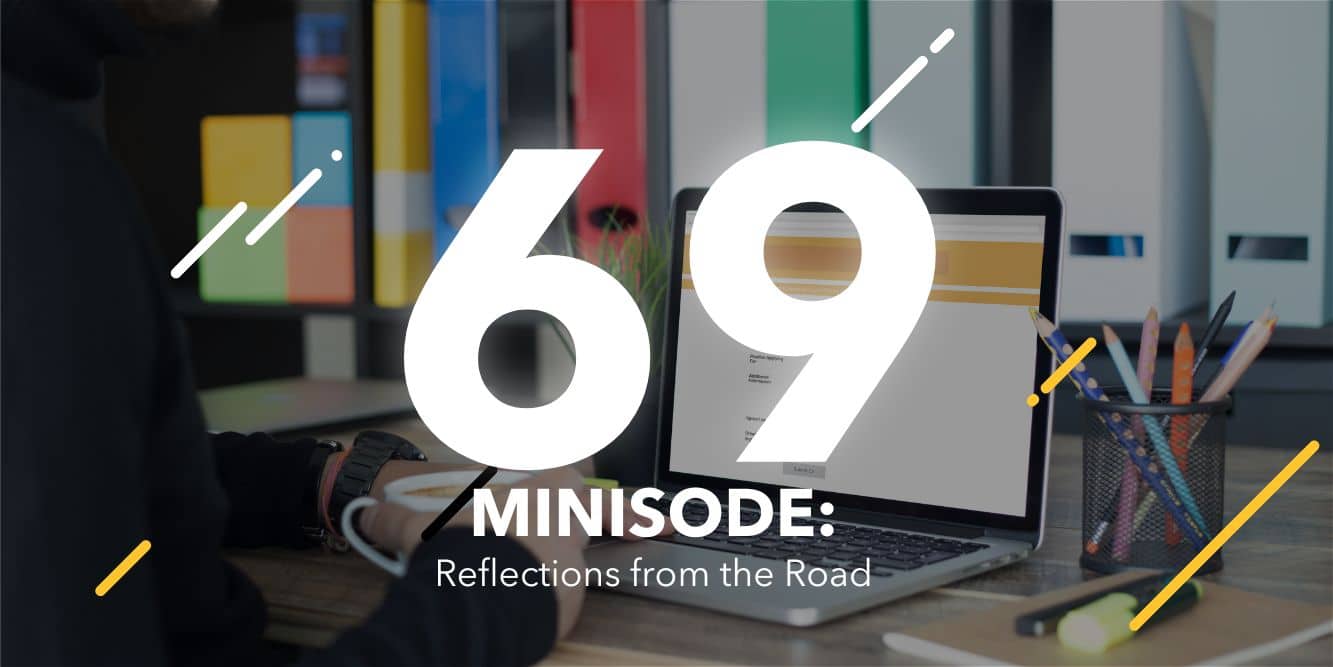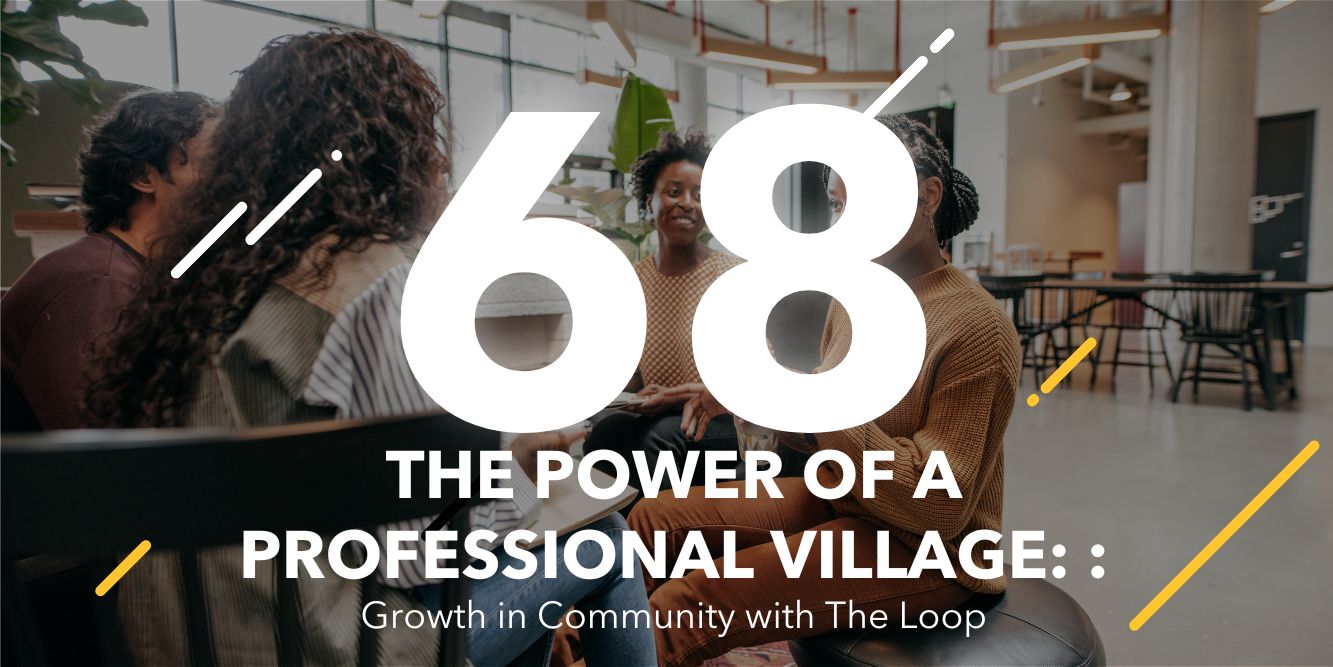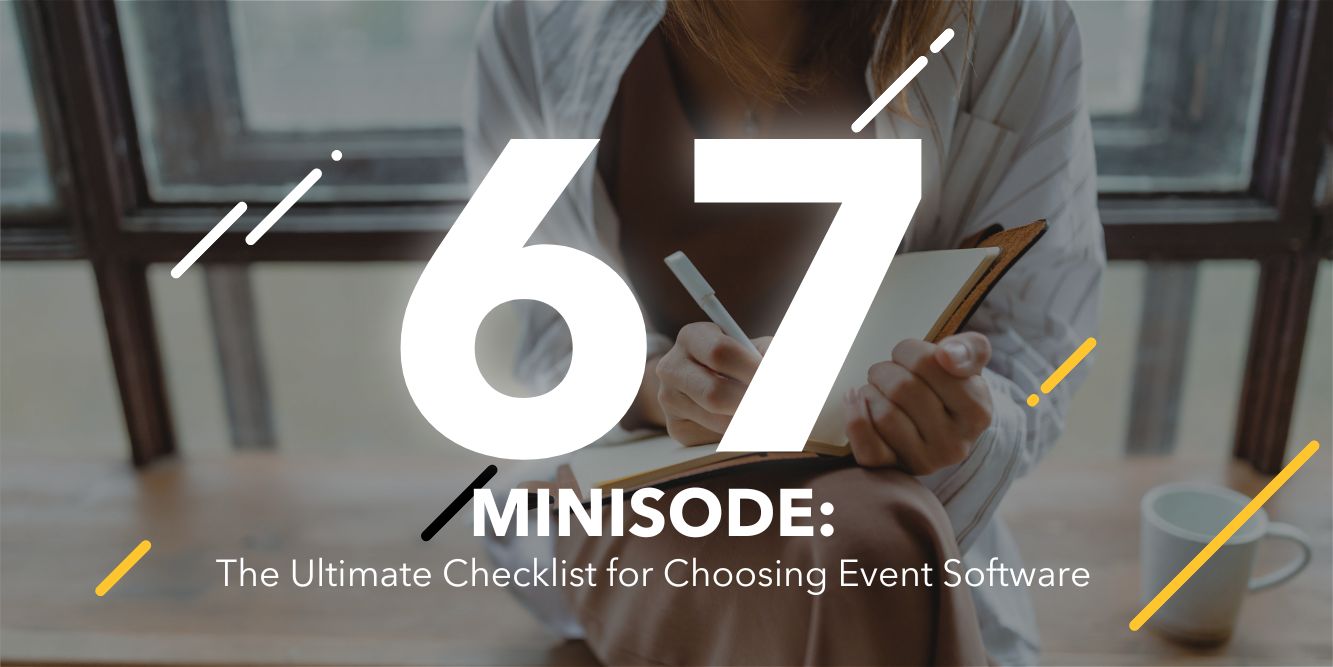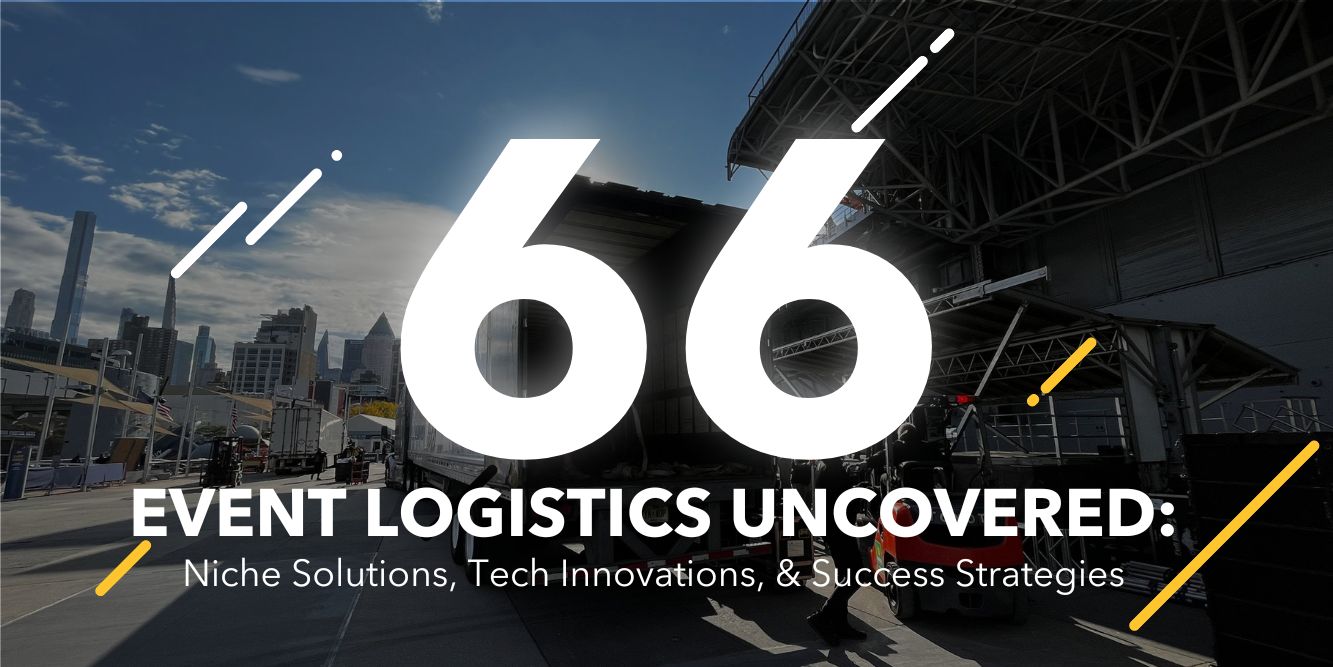What we’re talking about🎙️
- Don’t overlooking the behind the scenes experience for the event crew. Make sure they have built in times for breaks and water on site. [00:10:37]
- There is no such thing as a “perfect show” so don’t take that as an excuse to treat people poorly. [00:12:15]
- Labor frustration: putting reputation and trust in someone they have never met. If you’re gonna charge that much, you better be worth that much. [00:15:20]
- What the industry needs? Full disclosure on budgets and the RFP process, because a lot of times those blast out an RFP or you’ll get one, you won’t know what the budget. [00:20:04]
Listen 🎧
Watch 📺
Read the Transcript 📚
[00:00:36] Jess Cook: Hello and welcome back to another episode of Corralling the Chaos. I’m your guest host. Jess Cook, head of content at LASSO, and today I’m here with Korey Troyer, business Development Director at Event Production Company Heard Global. Korey has been in the industry for over 25 years with experience ranging from sports and entertainment, experiential marketing, corporate events and theater production, and has [00:01:00] been on both the agency and the client side.
[00:01:02] So we’re super excited to have him have him here with us today. Welcome to the show.
[00:01:08] Korey Troyer: Thanks. Glad to be here. I love what you guys do. I love this podcast. It’s great.
[00:01:12] Jess Cook: Oh, that’s so great to hear. Thank you. It’s definitely a, labor of love for sure. It’s a lot of work and a lot of fun. And hopefully a lot of value for people.
[00:01:22] So thanks for saying that. Can you tell us a bit about yourself and, what Her Global does and what you do at Heard Global?
[00:01:28] Korey Troyer: Sure. And you hit my, quick buyout again, I started. Back in the day with experiential agency on the road doing a back pre smartphone, it was called mobile marketing.
[00:01:41] And then got into corporate rock and roll, Schwartz and entertainment, and then eventually found corporate theater and fell in love with that because of all the different elements of it to where like in corporate rock and roll you, do a lot of pre-production and it is hectic and it is heavy lifting.[00:02:00]
[00:02:00] Once a band goes on, you got 75 minutes and it’s done. Whereas in COR theater, it’s, people forget the theater park, where there are cubes, there are there’s actual choreography where you’re putting people on and off stage and spiking the stage, making sure they hit their marks and stuff like that.
[00:02:16] So that’s, like how I got to where I am. My role at Heard is business develop. But heard we’re, an interesting company. My, my Csso o Fred Hether puts it really Lee when he says we’re a 25 year old startup . So yeah, we started out, events com was the company’s name for 25 years.
[00:02:40] Very well established company with a lot of blue chip clients. And what happened is the owners wanted to sell. And unfortunately it was in December, 2019 when Glenn had bought the company and he [00:03:00] covid hit, didn’t lay anyone off, didn’t furlough, didn’t cut, pay pocketed down, started to build the company that, that he wanted to build where he, we actually hired.
[00:03:11] And I was hired like Covid. Yeah. So that was great. And then we rebranded as Heard Global. Mostly because Glenn is a, an international businessman, so we have a presence in Dubai, Cairo. We’re our CSO is on his way over to London shortly to open our London office. So we truly have a footprint rather than just the.
[00:03:38] that’s what we are. And, the thing is, that what we did is we fulfilled we, we’d fill several channels. So as a producer, Ben producer, I would go fi hire a production company for for my general session. And I’d hire a decor company to handle like all the decor of the, at [00:04:00] the gala and then a DMC for the ground transportation and the dining arounds and the excursions.
[00:04:04] Whereas we do that all in. We have all that in. Company, which I when I was on client side, I always wish we could have that. And and I found it and I’m working for that. So it’s, great. So, if I’m going in and I’m talking to someone about event production and they say we have a good relationship with our incumbent we have no problems.
[00:04:26] I’m like, Great. I, we believe in friendly competition. We also believe we’re all one community. I’m not gonna push anyone out. If they’re happy, great, but I can also say who else is your ground transportation? No one really, so then we can do that. So it’s, just a full arsenal of, up.
[00:04:48] Talent that we can throw at a client so that’s, great. And and we also expanded into sports and entertainment. Now we are in-house [00:05:00] at Trus Park of the Braves, and that’s, I’m Atlanta based, so that’s my main focus is dealing with those guys. And they are fantastic though I’ve dealt with sports teams in the past and the Braves are just a good people.
[00:05:13] We also have Fenwick Park and the the bison, red Sox. Austin FC and Q2 Arena, and we handle the Moody Center, which is the University of Texas. That’s where they play basketball. And we also have another one coming online as well. So I can’t really talk about that. But we have one, actually, another one in Austin, another one in New York, and possibly one in London, I’m hoping.
[00:05:41] But we’ll see where that goes. So it’s we, touch a lot of area.
[00:05:47] Jess Cook: Yeah, you that’s incredible. You, are very busy and, the very good kind of busy, which is, yeah. Amazing. H how many events would you say you are [00:06:00] producing or touching every month? Do you, if you could ballpark it?
[00:06:05] Korey Troyer: That’s, tough for me to say because we all have, there’s so many different categories that I may not touch. I know the guys. the guys in Boston are doing a bunch and I’m doing, I really couldn’t give a number, honestly. I know. It’s a lot, it’s too many to know. ,
[00:06:23] Jess Cook: it’s, that gives us an idea right
[00:06:25] Korey Troyer: Yeah. Yeah. So there’s a lot going on and it, like you said there’s, good stress in, there’s bad stress and, I think after everyone went through Covid and not working to have it so crazy that you’re pulling your hair out it, it, feels good again, a good feeling.
[00:06:42] Jess Cook: So yeah. That’s amazing.
[00:06:44] You, you talked a little bit about this, but I’d love to, to double click on something you said there, which was you, have a lot of kind of business avenues or, ways that you could be helpful to, new clients or to expand business with current clients. [00:07:00] I would love to know that seems like a pretty.
[00:07:04] Aspect of growing Heard global. What, else has led to the, company’s growth? Because it sounds like you’re growing at an incredible rate. Yeah,
[00:07:14] Korey Troyer: I think I honestly, I think it’s how we build credibility with clients. If you’re in the business long enough they’re, there are a couple kind, there are a couple ways you can do things.
[00:07:28] A lot of people are in for the fast buck, the quick up. I’ve never been like that. If someone doesn’t need it, I’m not gonna try and sell it to ’em. In fact, I’ll tell people, you don’t need something. If they don’t need it, I’ll say you really don’t need that. And yes. Will that knock off a little of the, revenue there?
[00:07:47] Yeah. But you’re building credibility later on cuz they’re thinking, God, I’m so glad we didn’t do that. And then they come back and I think that a lot of us, we build off a friendly competition. We build off. [00:08:00] Just honesty and just saying you don’t need that. You can get without that.
[00:08:05] But on the other hand especially when you’re dealing with a lot of people, especially in the smaller meeting space, you end up dealing with the CEO’s, executive assistant or someone who works in marketing and they say, Hey, guess what, John, you get to do this event. He doesn’t know how to do it event.
[00:08:26] So you know that. You, have to tell them Hey, maybe you do need a speaker timer. And they’ll go, oh, that’s right Jimmy Drone’s. On and on. Yeah. Yeah. Can we have a speaker timer? And you’re adding the stuff to it, not just to add it to it, but to give them a better experience and make sure that shell runs right.
[00:08:45] And that’s something I, I’d explained to To my colleague Corey, his name is Corey as well. Corey Madden, he’s our site producer at, Trus Park. He’s fantastic. And he went from a production role to a hybrid role [00:09:00] of production and client facing and client services. So I had to explain to him the reason these people don’t understand it is because they don’t know what they don’t know.
[00:09:09] It’s our job to help ’em out. Like I’ve written on stuff when they. What is 12 channels of wireless, meaning I’d go, oh, those are 12 microphones, and I, wrote it out and I was happy to do it, and they saw it and they’re like, thank you for explaining, because no one knew. I think that helps your growth a lot, just by being understanding and just going, I don’t know anything about your medical supply business and I wouldn’t assume so. So you don’t know my world, so I’ll, be as helpful as I can. And I think that’s really the key to a lot of our growth, to be honest.
[00:09:43] Jess Cook: Yeah. Yeah. And that builds that of You’re not, I then I know they’re not gonna sell me anything I don’t need.
[00:09:52] They’re, gonna tell me the things I really do. And that’s gonna be the expectation from your clients going forward is they’re gonna give me the things that I need to be [00:10:00] successful and nothing. I don’t, so that’s really, great to hear. I wanted to tell this story. So we actually connected with you, Corey, through LinkedIn.
[00:10:08] And you had shared a post of ours from, the lasso page. A video of someone on the podcast talking about the sustainability of events and, sustainability being really avoiding crew burnout and, employee burnout. And so I wanted to just dive in there a little bit.
[00:10:30] What about that really caught your eye and what made you wanna speak publicly about that on. .
[00:10:37] Korey Troyer: We, had just gotten off the show and our graphics op, she didn’t have to pull an all-nighter, but it was pretty close. Because it was like, Hey, can you fix all this stuff? And she was like, yeah, I’ll do it.
[00:10:52] And it was so presumptuous of the client just to go, here you go do it. And it, which is a great guy. [00:11:00] Great, client. His back was against the wall. So again, we’re helping people out. So his back’s against the wall, we go to that. Excellent. But then it, made me think of other shows I was on where we literally had to tell the client, these people have to go use the bathroom, so you need to have a break in there so that they can go and it’s just they forget that the people sitting out behind the tech drape in front of house and behind the.
[00:11:29] Backstage that they’re people, they need food. I’ve seen it where they know when, oh, you guys want food? Or even my favorite, walk into a ballroom and have your crew like your, all your hands standing there going, do you have any water? And there’s no water stations out. It’s, just not simple.
[00:11:49] They don’t need. not a whole beverage and craft services for the local crew loading in, but give these guys some water have some [00:12:00] respect. And, a lot of people are we tend to, in our industry we, cluster standing there at crew call over a cup of coffee and talking about this, client did this and this client.
[00:12:14] There’s never ever, been a perfect show where you got your assets on time, everything was perfectly formatted, and the show ran the way it should go. Never. So why is anyone surprised about that? But on the other hand, that doesn’t mean that people should be treated poorly because I know guys.
[00:12:37] And Daals, who will not do certain shows ever again because that client was so bad. And that’s disappointing because I’m like, Hey, where’s man’s not on this show? I go, why? Oh, remember last one? Oh, that’s right. So that’s why when, I saw that he was so spot on soap spota about these people need to be able [00:13:00] to, be treated well and the hours too.
[00:13:03] It’s I had when I was on client side, I had to keep a, I had to keep a crew on until midnight because we weren’t sure when our executive was gonna fly in. Like he, he wasn’t sure when he had his, own jet, so we were on standby for four hours. I had crews just sitting in their spots waiting for him.
[00:13:25] Gotta show up, , he disrespect. And I had to apologize cuz it was my boss sorry, I
[00:13:33] Jess Cook: think the client too gets so laser focused on the experience of the attendee that they forget that there is. Another experience of the people who have to build that attendee experience, right? Yeah. And yeah, I think it’s really incumbent on those who are in charge of kind of the production aspect of things to really advocate for that.
[00:13:57] Hey, remember we have people running this for [00:14:00] you, so we need to build in these breaks. We need to think about that. We need to make sure we have enough time to account for all of these things, for the humans putting your show together. So it’s great to hear that. Is just kind of part of your business model.
[00:14:15] Korey Troyer: Yeah. And a happy crew is a good crew. Seriously. I, have one guy telling me, I’ve said, my crews too well. I’m like, are you kidding me, ? He goes, yeah, they don’t need all this. And I’m like, look at all, they’re all happy, blah. It was a great show, yeah. When they’re, When they’re in a when, you’re in a good and you’re in a good.
[00:14:37] You’re in your happy spot, which is doing your job, just like everyone loves to do. It makes a better experience for everyone.
[00:14:44] Jess Cook: Absolutely. 100%. I would love to talk a little bit about the industry itself and, a couple of pain points that we, usually try to touch on with most guests on the show here.
[00:14:59] And, first I wanna [00:15:00] talk to you about your biggest frustration with the industry. What’s something you could change right now if, you had the power to
[00:15:08] Korey Troyer: steal a cloth from Albert Einstein? We stand on the shoulders of. All the people who came before us, all the work they put in to give us the structure that we have in place now is pretty impressive.
[00:15:20] And when I tried to think about it, it’s really hard to get completely frustrated about one thing because everything’s been done so well for so long. I think it, it’s, right now my frustration is labor. Because a friend of mine I worked with he, was doing this black Friday activation and we were putting brand ambassadors all over the country, nationwide, 200 of them.
[00:15:48] And he said to me, and it was so profound, he said, my problem with what I do is that every day I walk into work, I put my reputation, faith, and hope in someone. I’ve never. [00:16:00] I was like, wow. And he goes, we do that every day with people we work with. So that goes with your crew. After Covid, it really called the heard.
[00:16:11] There were a lot of people who left, and we all know this now. Not all the good people left and not all the okay people left. It was across the board. So now you get rates, day rates, which are going up, which I believe should have gone up a while ago. I think it’s great. It’s gone up to the point where people are making better money and they deserve it.
[00:16:36] But the problem is, you get a guy down here who’s getting the same rate as this guy up here. now. We were talking about it the other day and to quote Robert Conrad or VP of Production , he said, this is so cool. He said, yeah, if you’re gonna charge me that much, you better be worth that much. And I think that’s the problem is that there are, I know rock stars out there who [00:17:00] are these guys who get $1,200 a day and they’re worth every penny.
[00:17:05] I get other guys who are, make it almost that much. Who don’t know anything, to be honest. And I think that’s my frustration right now in the current environment is that everyone’s making top dollar, not just the great people, but everyone is. And that’s and, to be fair it’s, it’ll suss itself out eventually, but right now that’s, the biggest pain point.
[00:17:32] Jess Cook: Yeah. How do you think we solve that? Is that a, matter of education or, like you say, it’ll just darwinism its way to balance, or,
[00:17:43] Korey Troyer: I do think so. I think once you get the, new crop of people who are coming in we had a, guy who was fairly new to the industry that was working for us one day, and he, knew enough to get [00:18:00] by, but he was so dedicated and so ready to, learn and ready to work.
[00:18:05] I just said, Hey dude, come out. Everyone has the first. We’ll figure this out. Let’s start at the beginning cuz everything’s like water. It goes from here down to here. And, he was like, thanks man. I go, I want you on my show again. This is great. You’re learning, you’re doing great. So that guy’s gonna be, that guy’s gonna be a rockstar eventually.
[00:18:26] He’s, not there, he’s just beginning, but his attitude. So if we can find those people with that, that, that good attitude, that wanna. that wanna learn and want to, that, that learn our craft and our industry and, excel that’ll fix it. It’s just, right now we gotta get those guys who are just stepping in because it’s the gold rush.
[00:18:47] Let’s face it. It is a gold rush. So they’re stepping in cuz they can get, they can make money, but once they get up to here, they’re gonna be great. And I think that’ll level off. Yeah,
[00:18:57] Jess Cook: that’s a great point. [00:19:00] What’s something that in this industry, in the events industry, Always been done this way. And for podcast listeners, I just did the the, international sign for air quotes, always been done this way that you just feel like does not need to be done this way anymore can be reevaluated.
[00:19:20] Korey Troyer: I was thinking about that. And there and, I went two different directions. I went. I went like, how unions interact with us. That, that kind of came the top of mind. And I’ve dealt, you know what, local one, New York, local to Chicago. Phenomenal. Love working with those guys.
[00:19:41] They’re, the best of the best and, to be honest, most of ’em are worth every penny. And then you get out to some of the other locals. A little bit sketchier and I, just, we’ve always done things a certain way and I wish it would just like clean, not clean up, but [00:20:00] work itself out in a way that there’d be a little bit more collaborative.
[00:20:04] And, a lot of it’s been fixed already, to be honest. A lot of it’s been, done. To go into a room knowing you got 30 guys and to do headcount, you only got 20. You go over to the steward and go, where are my guys? Oh, I sent ’em next door cause they had something. and they’re like no If we could, clean that up, that would be great. But I think more than that, I think anything above that right now would be full disclosure on your budgets and the RFP process, because a lot of times those blast out an RFP or you’ll get one, you won’t know what the budget. and so you’re looking at their RFP and they put, they throw everything in there, So you put everything they want in the rfp, and let’s say you come up with a $500,000 estimate because you put everything in there, [00:21:00] but to find out later, that was just their wishlist, but they only really need this, this and this. And their budget’s $350,000. , if you would’ve known that, you could’ve gone through and picked out the stuff they didn’t need.
[00:21:16] Gone back and said, do you really need this or do you really need that? And I’m guilty of it myself. I’ve done it myself, said I don’t want to give ’em the budget cuz then they’ll just take my budget, just jam it full. But I’ve actually found, especially when I was on client side, here’s my budget, hit it and then they can.
[00:21:40] and then it’s much easier to give them what you want cuz I’ve been completely knocked out of it running because we blew the budget outta the water. Or conversely came in so low that it scared him that they were like, do these guys know we need, so transparency on budget and RFP process [00:22:00] is I think the thing that really, needs to change.
[00:22:04] We need to, do better and, I. I think the clients just have to trust you better, especially if you worked with them for years. Just gimme your budget, just, tell me what it is. Yeah, and I’ll get you there. So I think that’s the biggest thing that needs be changed.
[00:22:21] Jess Cook: We, I used to work I used to run creative department at an agency in ad agency, and we always used to tell people like, , if you tell us your budget, like we will spend every penny because we want to make sure that what we create for you is as absolutely perfect and great as it can be, right?
[00:22:40] So give us the budget that you are really willing to spend on this, cuz we’ll spend every penny, but it will be worth it. We’ll pull everything in there that you need to make it. as perfect as we can. So I totally agree with that. I think it just helps both sides come to that understanding of, this is what we have, and we will put everything in there [00:23:00] you need based on that.
[00:23:01] Nothing more, nothing less. 100%.
[00:23:05] Korey Troyer: Yeah. I’m, like, if that’s your budget, that’s your budget. We’ll fix it in. I’ll moonwalk stuff out of there. Yeah. I need that So you can move stuff around in your budget too. So if this isn’t as important, and it depends on the producer and the estimator, whoever’s putting it together, they may just pile on in this one point.
[00:23:28] They may pile everything into this one category. They don’t need that you can move that money over here. So it’s also being agile with your budgeting being able to go I, don’t really need that. I can move this around and, and, then when they see the labor, why do you have $50,000 worth of labor?
[00:23:50] Why am I paying to fly these guys in for this show? And it’s just can we use local guys? I’m like, no, we can’t. We gotta use our [00:24:00] guides. It’s just it’s, funny when you see that cuz they, they just, don’t get it. Sometimes the labor just makes ’em choke every.
[00:24:09] Jess Cook: How do you talk people through that?
[00:24:10] Because that is a point of education I think of yeah, there should definitely be somebody in the market that can do that. What’s, why am I flying someone in? How do you walk someone through that?
[00:24:23] Korey Troyer: It’s these are the best guys in the industry. Do you want that show?
[00:24:27] And they, Elsa know the show because we’ve worked with them. They know our equipment, they know what we do, they know our process. And these are the guys. It’s just like saying if you. Same thing for your office. If you work in an office environment, why do you have, why don’t you just let these people do this job instead of the person you hired for it?
[00:24:49] They’re like that won’t work. And I go, same with us. But I think honestly, when you go through the math with them, they get it. So if you say, why am I charging eight days, eight [00:25:00] eight day rate on this for these guys when the show is only like four days on you have to fly. Fly out. Those are two days, cuz we don’t do the half day travel day.
[00:25:10] That’s not cool. I don’t think anybody does any, so you got two travel days, then you have rehearsal, you have set, you have rehearsal, and then you go through it and they go, oh, okay. So, once you, just go through the maths of them they, get it the smart people. Yeah,
[00:25:27] Jess Cook: absolutely. I think too part of it is I can fly my folks in and the learning curve is gonna be almost zero.
[00:25:37] They’ve done this before. They’ve used this equipment before. I’ve worked with them before. So we can spend that time that I would spend with local talent, getting them up to speed on getting your event ready. So there’s that too. That’s an unseen thing that really, matters.
[00:25:52] Yeah. And then we
[00:25:52] Korey Troyer: explain to him. We get local people when we can. Like sometimes it’s, a win. When you got your best guy and you’re going to that [00:26:00] city and, let’s say you’re, going to Dallas and two, your elite guys are from Dallas. You’re like, there you go. We don’t have to fly those guys in.
[00:26:10] But when you explain to ’em, like the local crew, anyone who’s pulling, pushing. Doing that sort of stuff, the manual labor stuff, we get all local, so that’s done. The guys the, technical people. Need to be our guys. We can’t just hire someone local. It just doesn’t work. Sometimes it does.
[00:26:31] It’s worked out once for me or twice, but for the most part, take you just need your guys. That’s it. Yeah.
[00:26:38] Jess Cook: 100%. One last question for you. We like to ask this of every guest on the show. What is your hope for the live events industry?
[00:26:49] Korey Troyer: Stability. Stability. Because right now, People are throwing money at events last minute because [00:27:00] after it’s still the covid thing.
[00:27:03] Like you have companies, you have brands that are holding these dollars, holding these events, and then finally when they’re legal department or somebody says, okay, let’s do it, they dump it in and then boom, it’s great cuz now we got a show. But I’ve. Four weeks to plan a show that should have been taking eight to 10 weeks to plan.
[00:27:25] It’s that. And then like we talked about, the labor just to get the stability and, then people who want to do still as hybrid events where we’re gonna zoom in and all that stuff. If we can just level off that’s, what I hope for answer that we can level off and everything gets back to standard.
[00:27:43] Rather than this Wild West show we got right now, so I, I think we probably by, by next year, it’ll be much better. I know everyone was saying, yeah, by 2023 it’ll level up and it has stabilized a lot more than last year, but still. , it’s still a wild [00:28:00] west out there, and I hope it stabilizes
[00:28:01] Jess Cook: soon.
[00:28:02] I love that answer. I don’t know that we’ve heard stability yet, and I think that’s a really nice hope. Absolutely. Corey, this has been great speaking with you. We really, appreciate you being on this, on the show and bringing your expertise on building a business and what it takes to build something sustainable for your people so that we can continue to bring in great new talent who want to continue to.
[00:28:28] And, learn this craft. So thanks so much.
[00:28:30] Korey Troyer: Yeah, thanks Jess. I appreciate the time. It’s been a lot
[00:28:33] Jess Cook: of fun. Thank you listeners for joining us on another episode of Corralling the Chaos. If you enjoyed what you heard today, please subscribe to follow along. If you have any questions, please reach out to us podcast@lasso.io.
[00:28:46] We are here to help and

